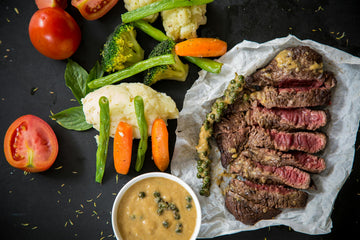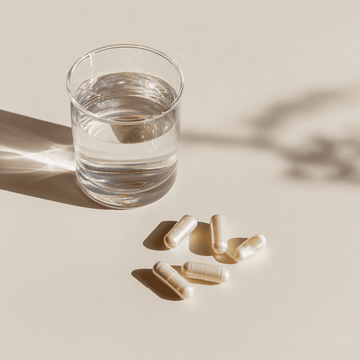According to the study “ Health in Germany Today 2023 ” , almost a third of adults in Germany regularly feel exhausted – 29.7% showed a pronounced fatigue pattern. If concentration falters after lunch and even a second espresso hardly helps, a mini-check is worthwhile:
1. Do you feel sleepy during the day even though you have slept about seven hours
2. Are short sections of stairs enough to get your heart racing?
3. Do you find it difficult to exercise because you simply lack the energy?
If two questions apply, first check your sleep routine, stress levels, and diet. Often, the body is lacking certain vitamins and minerals – especially iron, B vitamins, or magnesium. These nutrients in the body are the basis for ATP production; without sufficient amounts, your metabolism slows down. Blood tests clearly show whether there are nutritional deficiencies and whether dietary supplements can help fill them specifically.
What does supplementing actually mean?
The German Food Supplements Ordinance (NemV) defines food supplements as foods in dosed form that contain concentrated minerals, vitamins, or other substances to supplement the usual diet. Important:
-
Food supplements are subject to food law, not pharmaceutical law.
-
Manufacturers may only use scientifically proven health claims approved by EU Regulation 1924/2006.
-
Labels must include amounts per serving and warnings for high doses.
In short: Supplementation doesn't replace a meal. It supplements when laboratory results or typical symptoms indicate vitamin and mineral deficiencies – or when special life situations (intensive training, pregnancy, a strict vegan diet) increase the need. Those who already consume sufficient minerals through food will hardly benefit from supplemental pills; those who have deficiencies can take targeted countermeasures.
When are dietary supplements useful?
Five real everyday situations:
In various life situations, the need for micronutrients increases significantly – be it due to physiological changes, eating habits or external influences.
A classic example is menstruating women: Regular blood loss can lead to significant iron deficiency. In fact, up to 20% of women between the ages of 19 and 50 show an iron deficiency, measurable through ferritin and hemoglobin levels, for example.
Vegan or vegetarian diets also carry an increased risk of nutrient deficiencies—particularly in vitamin B12, which is found exclusively in animal-derived foods. Studies show that around 38% of vegans in Western Europe have critical serum levels, which is primarily reflected in holo-transcobalamin (holo-TC) and total B12 levels.
Another risk factor is intense endurance or strength training. Increased sweating leads to increased loss of magnesium and zinc. Athletes can lose up to 17 mg of magnesium daily through the skin alone—as measured by serum magnesium and zinc levels.
During pregnancy and breastfeeding, the need for numerous nutrients such as folate, iron, DHA, and iodine increases significantly. The usual diet is often insufficient to meet these needs, which can be detected, among other things, in ferritin and folate levels in the blood.
Last but not least, long-term use of certain medications, such as proton pump inhibitors (PPIs), can impair the absorption of essential minerals and vitamins. For example, the absorption of calcium, magnesium, iron, and vitamin B12 is inhibited—a deficiency is typically detected via serum magnesium and B12 levels.
Many manufacturers – including MTM Supplements – publicly publish lab reports. This makes it easier to compare the listed dosage with your personal blood profile. Those who train strenuously can use an electrolyte product like MTM Amino Electrolyte for a short time to quickly compensate for losses, rather than randomly combining several supplements.
Power quartet: B vitamins, iron, magnesium, zinc
A look at key micronutrients shows how essential they are for energy supply and physical performance – and in which situations shortages often occur.
B vitamins (B1 to B12) play a key role as cofactors in mitochondrial ATP synthesis—the central mechanism of cellular energy production. A deficiency can be exacerbated by chronic stress, excessive alcohol consumption, or a purely plant-based diet, as vitamin B12, in particular, is found exclusively in animal products.
Iron is essential for oxygen transport in the blood and cognitive performance. Iron deficiencies often occur in menstruating women or endurance athletes, whose iron needs are increased or increased due to losses through blood or sweat.
Magnesium supports muscle contractions, regulates heart rhythm, and is crucial for nerve conduction. Losses occur primarily through heavy sweating—for example, during exercise—or the use of diuretics, which promote excretion through the kidneys.
Zinc, in turn, is important for the immune system, skin regeneration, and the production of various hormones. Deficiencies often occur in vegetarian diets or under high physical and mental stress, as the need increases while absorption may be reduced.
These nutrients are crucial for daily performance – and should be specifically monitored and supplemented if there is an increased need.
A balanced diet of whole grains, legumes, nuts, and green vegetables already provides plenty of vitamins and minerals. If that's not enough, tailored supplements can help: A multinutrient complex in the Vitamins & Minerals category covers several building blocks at once; plant-based protein powders like MTM Vegan Protein supplement amino acids if your diet lacks protein.
Blood values remain the objective compass: If ferritin is below 30 µg/l or serum magnesium is below 0.75 mmol/l, targeted help is worthwhile until the minerals are back in the green zone.
Cell booster: Coenzyme Q10, creatine and L-carnitine
Sometimes the classic mix of vitamins and minerals isn't enough to squeeze out every last ounce of energy. Three of the body's own molecules then come into focus:
Some targeted compounds can directly support cellular energy production – particularly via the mitochondria – and thus promote both physical and mental performance.
Coenzyme Q10 is essential for the mitochondrial respiratory chain: It transports electrons within the membrane, thereby increasing ATP production. It also has antioxidant effects. In a placebo-controlled study, a significant reduction in fatigue was observed in ME/CFS patients after 12 weeks of taking the combination of coenzyme Q10 and NADH. A daily dosage of 100 to 200 mg is recommended – ideally with a high-fat meal, as absorption is fat-soluble.
Creatine serves as a rapid energy source in the so-called phosphate buffer system (Cr-P) and plays an important role in short-term peak performance, not only in the muscles but also in the brain. A research group from Jülich showed that 0.35 g/kg of creatine significantly improved cognitive performance after sleep deprivation. In everyday life, 3 to 5 g daily is common; a loading phase is not absolutely necessary.
L-carnitine acts as a transport molecule for long-chain fatty acids, which are burned in the mitochondria for energy production. It can also reduce muscle fatigue. In a 2024 study, 2 g of L-carnitine per day led to a noticeable reduction in subjective fatigue scores and an increase in serotonin levels.
These compounds demonstrate how targeted supplementation can help alleviate mitochondrial fatigue and improve energy production – scientifically supported and with practical dosage.
When to use?
-
Q10: from age 40 or during statin therapy.
-
Creatine: high sprint/strength load, night work, exam stress.
-
L-carnitine: strict veganism, endurance sports with high fat metabolism.
It's worth checking your body's nutrients beforehand: Plasma Q10 levels < 0.5 µg/ml, serum creatine deficiency, or carnitine levels < 30 µmol/l indicate the need for supplementation. Those taking medication or suffering from kidney problems should discuss dosages with their doctor.
Omega-3 fatty acids: EPA + DHA for head and heart
The Omega-3 Index (the proportion of EPA + DHA in red blood cells) has become a reliable long-term marker. Values between 8% and 11% correlate with lower cardiovascular risk; an index below 6% is considered in need of improvement.
Current data show that large parts of the German population only reach 4–6%. The cause is low consumption of fatty fish and seaweed. An index test (finger prick) provides clarity within two weeks.
Sources of intake (EPA + DHA per serving)
-
100 g herring ≈ 2 g
-
100 g wild salmon ≈ 1.2 g
-
1 capsule of highly purified algae oil ≈ 250–500 mg
Just 250 mg daily improves cognitive function; for an index ≥ 8%, professional associations recommend approximately 1–2 g. Those who rarely eat fish or are vegetarians should opt for algal oil – free of heavy metals and tasteless.
Practical tip: Consume Omega-3 with a main meal; this increases bioavailability. Check your index after three months to see if your body is actually absorbing the fatty acids.
Plant power against stress: Ashwagandha, Rhodiola, Ginseng
Adaptogens are herbs that dampen the stress response without causing drowsiness. Three candidates demonstrate reliable effects:
Plant adaptogens can also effectively contribute to stress management and improving mental performance – often by regulating the hormonal stress response and supporting mitochondrial function.
Ashwagandha is a traditional Ayurvedic medicinal herb known for its calming and stress-regulating properties. It can reduce perceived stress and lower blood cortisol levels. A meta-analysis of nine randomized controlled trials (RCTs) demonstrated significant improvements in both subjective stress reports and measured cortisol levels, particularly in cases of chronic stress or fatigue.
Rhodiola rosea , also known as rose root, has a stabilizing effect on mood and concentration, especially in cases of mental fatigue and stressful periods. A recent review confirms that the plant can improve cognitive performance and stress resistance, especially during mentally demanding activities.
Ginseng , especially in the form of Panax ginseng, shows positive effects on subjective fatigue and the immune system. A so-called umbrella review—a summary of several systematic reviews—confirms its benefits, particularly for chronic fatigue and to support recovery after illness.
These herbal active ingredients offer a natural supplement to support stress, fatigue and exhaustion – with growing scientific evidence and good tolerability when used correctly.
Dosage – short & sweet
-
Ashwagandha extract (KSM-66 or Shoden): 300–600 mg daily.
-
Rhodiola: 200–400 mg standard extract, take on an empty stomach.
-
Ginseng (Panax or Korean Red): 1–2 g root powder or 200–400 mg extract.
Anyone taking medication (e.g. blood pressure lowering medication) should check for interactions beforehand.
Proteins, Aminos & Electrolytes: Fuel for Training
Sweating consumes fluids and minerals—for summer runs, up to 1.2 g of sodium, 120 mg of potassium, and 60 mg of magnesium per liter of sweat. Compensation can be achieved with three building blocks:
-
protein
-
1.2–1.6 g per kg of body weight promotes muscle building.
-
Plant-based powders are more easily tolerated; one serving provides 20–25 g of protein.
-
Essential amino acids (EAA)
-
Bridging long fasting periods before or after training.
-
10 g of EAA in water is enough to slow down muscle protein breakdown.
-
Electrolyte drinks
-
400–800 mg sodium per liter of fluid plus potassium, calcium, magnesium.
-
Ideal for sessions > 60 min or heat; otherwise, water and a pinch of salt in the food is sufficient.
Conclusion: First check your plate – whole grains, legumes, nuts, colorful vegetables – then add specific supplements if sweat and training workload are above average.
Quality checklist: purity, dosage, origin
Before you put a dietary supplement in your shopping basket, this quick check will help:
When purchasing and evaluating dietary supplements, it is worth taking a close look at various testing criteria to ensure quality, safety and effectiveness.
Manufacturing: Ensure that the product was manufactured under controlled conditions – ideally according to GMP (Good Manufacturing Practice) or HACCP standards. A traceable batch number and the "Made in EU" label provide additional transparency and traceability.
Contaminants: High-quality products are tested for possible residues such as heavy metals (arsenic, cadmium, lead, mercury) or solvents. Reputable manufacturers provide laboratory analyses or certificates upon request or publicly.
Dosage: The nutrients contained should be based on the recommendations of the German Nutrition Society (DGE) and at the same time should not exceed the so-called “Tolerable Upper Intake Levels” (UL) in order to ensure safe use.
Declaration: Clear and understandable information about ingredients is essential. Vitamins and minerals should be listed in milligrams or micrograms per serving – transparent and easy to compare.
Evidence: The product's advertised effects should be based on EU-approved health claims. These are based on scientifically sound evidence and are subject to rigorous testing by the European Food Safety Authority (EFSA).
These testing steps help you identify high-quality nutritional supplements – and provide sound support for your own health.
These points prevent under- or overdosing and help you spend money only on products with proven benefits.
First the plate, then the capsule: Replenish nutrients in the body with food and minerals
Nutrition already provides a large part of the daily requirement:
Even with a balanced diet, many important micronutrients can be covered in a targeted manner – provided you know the best sources and use them correctly.
Oat flakes (60 g) provide around 2 mg of iron and 140 mg of magnesium per serving—an ideal breakfast food. Combined with a fresh apple or a squeeze of lemon juice, the vitamin C they contain can further enhance iron absorption.
Pumpkin seeds (30 g) are packed with valuable nutrients: about 4 mg of zinc and around 10 g of plant-based protein. Briefly roasted, they develop a nutty aroma and are perfect as a topping for salads or vegetable dishes.
Lentils , cooked in a 200g serving, provide approximately 15g of protein, 3mg of iron, and 70µg of folate. They are particularly versatile – whether as a stew, in curries, or as a plant-based alternative to Bolognese.
Broccoli (150 g) boasts 90 µg of vitamin K and 70 mg of calcium. To preserve heat-sensitive vitamins like vitamin C, the vegetable is best steamed gently rather than boiled vigorously.
Sea fish , such as herring (100 g), provides about 2 g of omega-3 fatty acids and 20 µg of vitamin D. Two portions per week are sufficient to cover the basic requirement of omega-3 – a simple and effective contribution to heart and brain health.
These foods can be easily integrated into everyday life and provide a natural basis for a needs-based supply of essential nutrients.
If these foods are consumed regularly, the need for additional supplements decreases significantly. Only if laboratory results continue to show gaps do dietary supplements remain useful.
Final thought: Your path to more energy
Dietary supplements help fill gaps—nothing more, nothing less. Start with sleep, stress management, and a varied meal plan. Check your blood work, read labels critically, and choose products that demonstrate transparent quality. This way, your body gets exactly the building blocks it's missing, and you'll feel the difference where it counts: when working concentratedly, exercising, and relaxing in the evenings.
Stay curious, listen to your body's signals, and give your metabolism the tools it truly needs. This will turn tiredness into drive.
FAQ
As a vegan, do I always need B12?
Yes, because plant-based foods do not provide usable B12; 250 µg of cyanocobalamin per week covers the requirement.
Do magnesium capsules improve sleep?
If magnesium deficiency is proven, yes; otherwise, a magnesium-rich meal (e.g., oats + banana) will have the same effect.
How do I find the right dosage?
Check blood count, then follow DGE recommendations and adhere to tolerance limits.
Combination preparation or single substance?
Combinations save time but risk unnecessary excess quantities; individual materials are more precise but require more planning.
Can supplements interfere with medications?
Strong interactions are possible, e.g., calcium + thyroid hormones. Consult a doctor.
Are energy shots more effective than capsules?
Liquid forms often work faster, but do not last longer and cost more per active ingredient.
When is there a risk of zinc overdose?
The upper limit is 25 mg/day for adults; higher amounts should only be taken under medical supervision.




